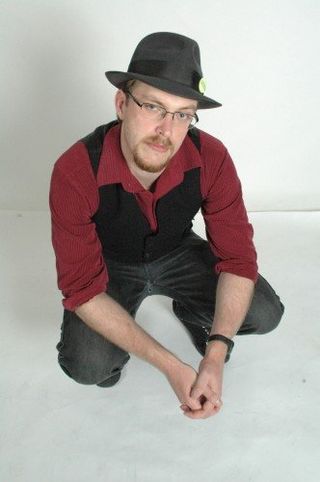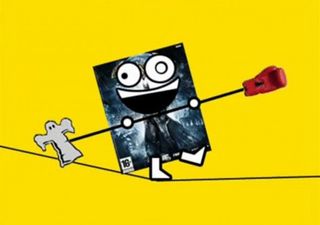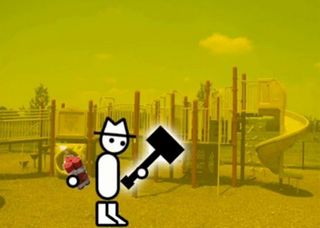Community heroes: Yahtzee, for Zero Punctuation

Community heroes is our ongoing series of interviews with some of PC gaming's greatest heroes – the pillars of the community who have devoted huge chunks of time and love to make the PC a better place to game. Today, we're letting you rub your eyeballs all over this interview with Yahtzee, the guy behind Zero Punctuation, the Trilby adventure games.
PC Gamer: So I first heard of you as the indie developer of a great series of free adventure games - 5 Days a Stranger, 7 Days a Skeptic, and 6 Days a Sacrifice. Were you planning to develop games for a living at that point?
Yahtzee : That was the plan, and I suppose still is. Before ZP I applied for pretty much every game developer in Brisbane - they're surprisingly thick on the ground here - for QA, junior design positions, etc., using those games as a resume. It's still something I want to do professionally at some point. It should be easier to get into than it was before - I now have a lot of game developer friends, because it seems like every developer I meet watches ZP. Even if I bag out their games. Especially, even.

PC Gamer: Why did you decide to start making narrated videos about games, as opposed to just writing them or continuing to make games?
Yahtzee : The first video I made was after playing the demo of The Darkness. I realised I had a lot of things I wanted to say about it, so I made the first ZP for Youtube. It went down so well that within weeks I was doing it professionally. At that point it was out of necessity - I was unemployed at the time - but now it's become part of me. I've come to identify now as a game critic, not merely someone who criticises games for a living. I'd still be a game critic even if I didn't write down my thoughts on everything I play. I can't help it.
PC Gamer: Am I right in thinking you stopped making games after Trilby: the Art of Theft in 2007? That was around the time Zero Punctuation was becoming popular - were the two related?
Yahtzee : Pretty much. Making ZP is my day job now, so it takes up a lot of my time, playing a new game every week and animating the videos. I still have a few game projects and I still work on them, but progress is the slowest it's ever been. Over the years doing ZP every week has given me greater and greater insight into game design theory and practice, though. Looking back on my old games, I see hundreds of ways they could have been improved. So I get delayed by being more critical of myself. If I ever put out anything again, it'll have a lot more experience behind it than my older stuff.
PC Gamer Newsletter
Sign up to get the best content of the week, and great gaming deals, as picked by the editors.

PC Gamer: Some of your best gags are in the animations - do you do those after you've recorded the review? Do you ever make a point specifically for the fun of illustrating it?
Yahtzee : I generally write the script first, then do the images, then record the voice, because sometimes I'll be making the images and realise a point can't be easily visualised and I need to reword it a bit. Colourful analogies help. 'This game controls bad' doesn't immediately throw up an image, but 'this game handles like a stag on an icy lake with its antlers tied to two different windmills' does.
PC Gamer: I don't know if you've seen your Wikipedia page lately, but there's a hilarious section where people have scoured the net for any trace of positivity in your opinions of games. Are there any you slagged off on ZP but actually rather like?
Yahtzee : I try not to say anything I don't genuinely believe. I've seen a lot of online reviewers who make the mistake of thinking you just have to heap funny insults on all the games all the time to draw a crowd. I think it's far more compelling if there's honesty there. Critics shouldn't hate everything. They should have an enhanced appreciation for their medium, so they're passionate with their love for their favourites but equally passionate with their hate for anything that isn't up to standard. It's just that hate is funnier and easier to remember, so critics often get labelled as haters. But to answer your question, I do have a guilty enjoyment for Alone in the Dark and Mirror's Edge. They're wracked with issues, but I find games that try to do something new and fall apart far more compelling than the merely mediocre games that don't have an original thought in their heads.

PC Gamer: Is the prevailing negativity an intentional angle, or something that comes out naturally when you look at what's funny about games?
Yahtzee : Like I said, hate is funnier. That's why I've occasionally done retro reviews of games that I absolutely love, like Silent Hill 2 or Prince of Persia: Sands of Time. It's mainly to challenge myself to be funny when I'm gushing, too.
PC Gamer: Much of the reason ZP is funny, to me, is that it highlights how absurd the gameisms we've come to accept are. Do games need to grow out of stuff like this, or is hacking a BioShock camera mid-jump just a necessary convenience for the medium?
Yahtzee : I think realism is always going to have to take a back seat to fun. A game where you die of exhaustion from running at full sprint for two hours, or where you unexpectedly drop dead from an infected bullet wound you received twelve hours ago and left untreated, these games would not be fun. Look up a game called Robinson's Requiem some time and find out just how fun realism can be.
PC Gamer: Is there anything you particularly like about PC gaming, as opposed to other platforms?
Yahtzee : I like how it's still the easiest platform for digital downloading. But in all honesty, consoles are the bigger money right now and a lot of games on PC suffer from being console ports, so for practicality's sake I mostly play the console versions with the analog sticks as nature intended. Especially since my laptop's getting on a bit and I'm afraid subjecting it to something like Assassin's Creed 2 would result in it being taken away by social services. Still, rest assured that no console has come up with a system as efficient as a mouse, so PC will remain the go-to guy for RTS and the more complex mouse-driven RPGs. For what it's worth.
PC Gamer: Your first novel is out next month, right? The synopsis says it's from the perspective of a minor character in an MMO - what inspired you to write about that?
Yahtzee : I got the idea from playing World of Warcraft for a few months many years ago. I noted that the game takes place in a moment of frozen time - nothing ever dies permanently and the world can never undergo significant change because every new player has to have a chance to do every quest. It was particularly odd in WoW, because the game follows on from the established canon of the Warcraft RTS series. Would there be characters who remembered the pre-MMORPG days when dead life-forms didn't respawn after a while? I did some idle writings from that perspective, and it sort of went on from there. The game in the book now has very little in common with WoW, but there are aspects players will no doubt find familiar.
Most Popular


